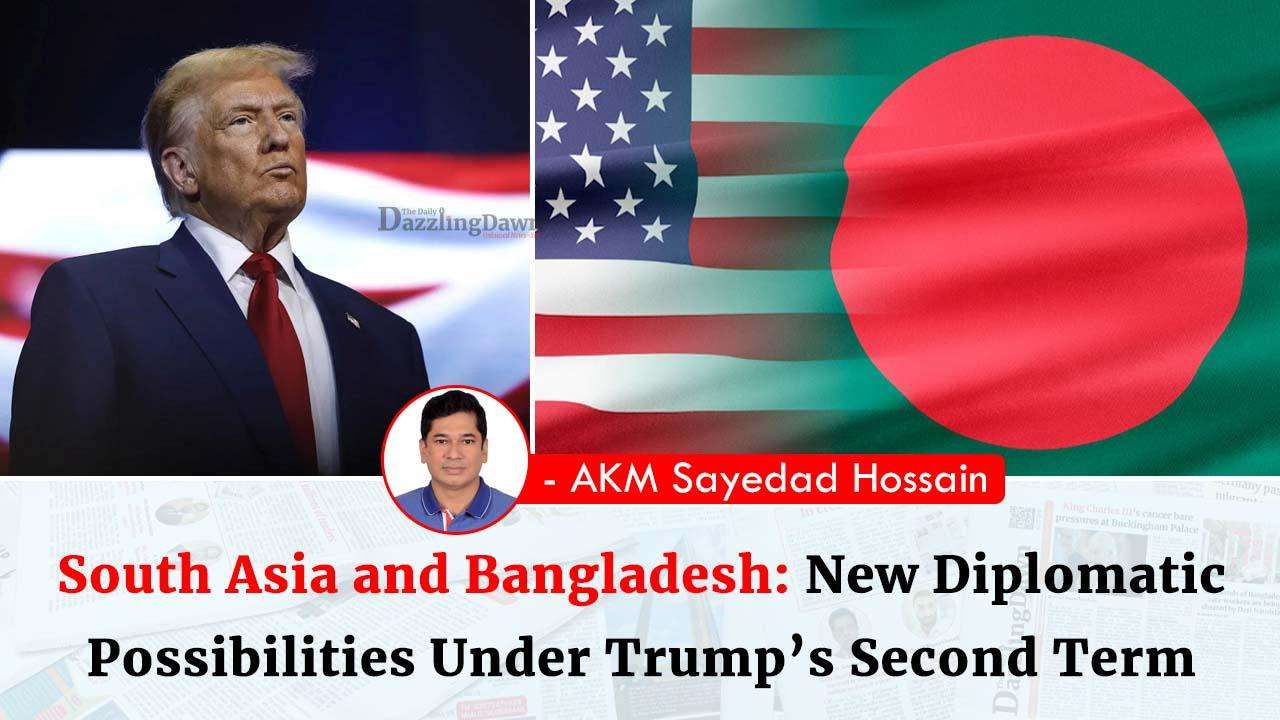The unthinkable has happened—Donald Trump is back in the White House. His return has sent ripples through global diplomacy, with South Asia, a region of immense economic potential and geopolitical significance, once again under the lens of Trump’s unpredictable foreign policy. Amid these shifting tides, Bangladesh stands poised to seize new opportunities under Trump’s second administration, leveraging its diplomatic agility, economic resilience, and visionary leadership.
Trump’s Return: A Game-Changer for South Asia
Trump’s "America First" mantra, characterized by bold and often transactional policies, signals significant changes in global trade and diplomacy. This time, his agenda may be even more calculated, with a focus on countering China’s growing dominance in the Indo-Pacific region. For South Asia, this could open doors for smaller nations like Bangladesh, which have long balanced their geopolitical relationships with major powers.
India will undoubtedly remain central to Trump’s regional strategy, but Bangladesh’s unique position—as a growing economy and a key player in the Indo-Pacific—offers it a chance to step into the spotlight. Under the pragmatic leadership of Nobel laureate Dr. Muhammad Yunus, Bangladesh has the potential to navigate this complex geopolitical environment with finesse.
Dr. Yunus: A Visionary Leader
Dr. Muhammad Yunus’s leadership has ushered in a period of transformative change for Bangladesh. Following the peaceful student-led transition of 2024, Yunus has focused on economic reform, social justice, and sustainable development. His approach, rooted in dialogue and inclusivity, contrasts sharply with Trump’s hard-nosed policies but also offers opportunities for alignment, particularly in trade and development.
The United States is one of Bangladesh’s largest buyers of ready-made garments (RMG), a cornerstone of its economy. While Trump’s trade policies may seem protectionist, Bangladesh could negotiate deals that appeal to Trump’s economic sensibilities, emphasizing fair trade and innovation. This pragmatic approach could strengthen bilateral relations and ensure mutual benefits.
Economic Diversification: The Need of the Hour
Bangladesh’s reliance on RMG exports, while significant, cannot sustain its long-term economic aspirations. Trump’s anticipated trade policies, including significant tariffs on Chinese goods and at least a 10-20% tariff on other imports, could disrupt global trade flows. However, these shifts also present opportunities for Bangladesh to diversify its economic base.
Emerging sectors such as technology, clean energy, and sustainable agriculture hold immense potential. Under Dr. Yunus’s guidance, Bangladesh could position itself as a leader in these industries, attracting foreign direct investment (FDI) and fostering innovation. This strategic pivot would not only mitigate risks associated with global trade uncertainties but also redefine Bangladesh’s economic identity.
Navigating Geopolitical Tensions: U.S., China, and Beyond
Bangladesh’s diplomatic balancing act between the U.S. and China will face heightened scrutiny under Trump’s second term. While Chinese investments through initiatives like the Belt and Road Initiative (BRI) have driven significant development in Bangladesh, maintaining strong ties with the U.S. remains critical for trade and security.
Trump’s focus on the Indo-Pacific presents an opportunity for Bangladesh to enhance its strategic importance. By emphasizing its commitment to regional stability, maritime security, and counterterrorism, Bangladesh can align itself with U.S. priorities without alienating China. This nuanced diplomacy will be key to sustaining Bangladesh’s growth and stability.
Trade Strategies for Bangladesh Under Trump’s Policies
Trump’s likely imposition of tariffs offers both challenges and opportunities for Bangladesh. Analysts predict a 60% tariff on Chinese goods and a 10-20% tariff on all other imports. These measures could disrupt global supply chains but also open doors for Bangladesh to strengthen its trade relationship with the U.S.
Key Strategies:
1. Proposing Reciprocal Trade Agreements:
Bangladesh could offer zero-duty access to U.S. products in exchange for tariff-free access for Bangladeshi exports. This approach, particularly for the RMG sector, could solidify Bangladesh’s position in the U.S. market
2. Reducing Tariff Barriers:
Current U.S. tariffs on Bangladeshi goods average 15.70%. Negotiating reductions to single-digit rates would enhance competitiveness and boost export revenues.
3. Leveraging Trade Surplus:
With a $6 billion trade surplus with the U.S., Bangladesh has leverage to negotiate favorable terms, ensuring continued growth in exports.
4. Pursuing Bilateral Agreements:
As Bangladesh prepares to graduate from its Least Developed Country (LDC) status in 2026, securing bilateral trade agreements like a Bilateral Free Trade Agreement (BFTA) or Strategic Trade and Investment Partnership (STIP) will be crucial.
5. Positioning as an Alternative Manufacturing Hub:
A U.S.-China trade war could prompt American companies to diversify their supply chains. Bangladesh’s competitive labor costs and growing infrastructure make it an attractive alternative.
Security and Stability in the Indo-Pacific: A Bangladeshi Perspective
The Indo-Pacific region is becoming a focal point of strategic competition, where the balance of power is influenced by key global and regional actors. For Bangladesh, positioned at the crossroads of South and Southeast Asia, this strategic location presents both opportunities and challenges in contributing to regional security and stability.
Strategic Engagement with the United States
Former U.S. President Donald Trump’s Indo-Pacific policy focused on military strength, freedom of navigation, and regional alliances. Bangladesh, with its contributions to international peacekeeping, counterterrorism, and maritime security, has potential to be a proactive player. Strengthening defense ties with the U.S.—through joint exercises, capacity-building, and intelligence sharing—can enhance Bangladesh’s role in addressing regional threats, such as piracy and transnational crime, while ensuring the security of vital sea lanes in the Bay of Bengal.
However, a military-centric approach could exacerbate regional rivalries, particularly between China and the U.S. Bangladesh must carefully navigate these dynamics to avoid being drawn into great power competition.
The Socio-Economic Dimension of Security
Security is not just the absence of conflict but the presence of conditions that foster peace. Dr. Muhammad Yunus’s focus on social justice, equitable economic opportunities, and sustainable development aligns with this broader definition. Economic inequality, social exclusion, and environmental degradation often lead to instability, which extremist ideologies and organized crime exploit.
Bangladesh’s progress in poverty alleviation, women’s empowerment, and disaster resilience offers a model for inclusive development. Investments in education, healthcare, and infrastructure are vital for building a resilient society capable of facing both internal and external challenges. Bangladesh’s innovative social enterprises, inspired by Dr. Yunus, can catalyze change, creating opportunities and fostering social cohesion.
In the Indo-Pacific, where socio-economic disparities and climate vulnerabilities are prominent, Bangladesh’s approach can serve as a model for other nations facing similar challenges. Integrating development with security policies ensures that immediate threats are addressed while laying the foundation for long-term stability.
A Balanced Path Forward
Bangladesh’s strategic approach lies in balancing defense partnerships with socio-economic initiatives. By strengthening defense collaborations, Bangladesh can enhance its regional standing while maintaining its non-aligned foreign policy. At the same time, prioritizing development-oriented security ensures that Bangladesh remains a stabilizing force in the Indo-Pacific.
Positioning itself as both a security contributor and an advocate for inclusive development, Bangladesh can play a pivotal role in shaping the future of the Indo-Pacific. Its actions, combining military strength and social progress, can demonstrate how nations in the Global South navigate complex geopolitical realities while prioritizing the well-being of their citizens.
Preparing for the Future: Opportunities Amidst Challenges
Trump’s second term presents a unique set of challenges and opportunities for Bangladesh. By embracing economic diversification, strategic diplomacy, and sustainable development, Bangladesh can navigate this complex landscape and emerge stronger. The potential benefits include enhanced market access, increased FDI, and a more resilient economy.
Conclusion
Trump’s return to the White House has reshaped the global order, but for Bangladesh, it represents a horizon of possibilities. Under the visionary leadership of Dr. Yunus, Bangladesh can redefine its role on the world stage, leveraging its strengths to build a future of innovation, resilience, and global engagement. The path ahead is fraught with uncertainties, but with the right strategies and a commitment to sustainable growth, Bangladesh is well-positioned to thrive in this new era.
--
Author: Director, National Institute of Strategic Studies








.svg)
